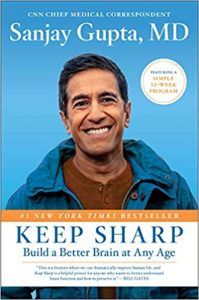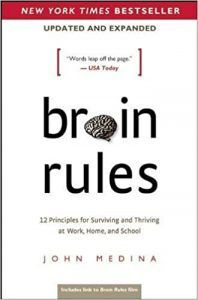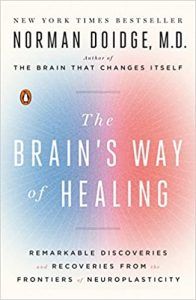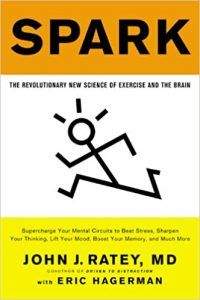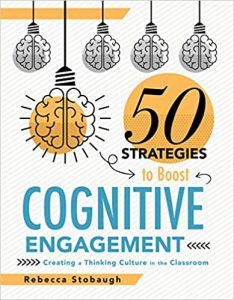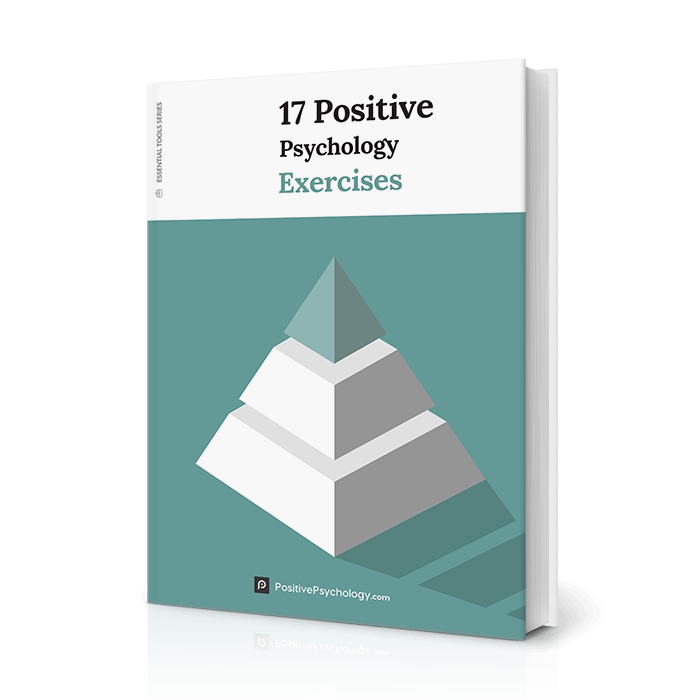What Is Cognitive Health & Why Is It Crucial for Wellbeing?
 Health and wellbeing have been studied since at least the 1950s as a complex construct involving several factors.
Health and wellbeing have been studied since at least the 1950s as a complex construct involving several factors.
These factors include diet, exercise, sleep, social engagement, emotional balance, and cognitive health (Bart et al., 2018).
While cognitive health has often been included as a dimension of health and wellbeing, its study as a singular focus is a more recent development (Aidman, 2020).
This article will explore and clarify the concept of cognitive health and cognitive fitness, and offer some initial tips on how to develop and maintain this important component of health and wellbeing for yourself and your clients.
Before you continue, we thought you might like to download our three Positive Psychology Exercises for free. These science-based exercises will explore fundamental aspects of positive psychology including strengths, values, and self-compassion, and will give you the tools to enhance the wellbeing of your clients, students, or employees.
This Article Contains:
- What Are Cognitive Health and Mental Fitness?
- 2 Real-Life Examples of Cognitive Health
- Why Is Maintaining Cognitive Fitness Important?
- Focusing on Cognitive Strengths: Benefits and Examples
- 5 Best Cognitive Health and Fitness Books to Learn More
- Helpful PositivePsychology.com Resources
- A Take-Home Message
- References
What Are Cognitive Health and Mental Fitness?
In 1964, the World Health Organization sought to redefine “health” beyond the mere absence of disease.
The World Health Organization now defines health as a positive state of “physical, mental, and social wellbeing” (Bart et al., 2018, abstract).
With this new definition of health came a focus on positive practices such as the proactive prevention of disease and cultivation of health-related strengths through efforts such as physical exercise, cognitive challenge, and social skills training.
Cognitive health is one dimension of having a healthy brain.
In cognitive terms, a healthy brain would possess basic capacities for:
- Attention
- Directing and completing complex movements
- Understanding and expressing language
- Processing visual-spatial stimuli
- Learning new things
- Recalling things from the remote past
- Social perception and judgment
- Regulating emotions
Writers and researchers have sometimes used the terms “cognitive health” and “cognitive fitness” interchangeably. This has led to some confusion about the terms.
Recent researchers have sought to differentiate between basic cognitive health, as defined above, and mental or cognitive fitness.
These researchers conceive mental or cognitive fitness as a higher form of cognitive health, cultivated by elite performers in fields involving high demand and high stakes, such as elite military forces, professional sports, and organizational leadership (Aidman, 2020).
Cognitive fitness also includes a crucial component known as cognitive readiness.
Cognitive readiness was developed by defense experts to explain how military personnel mentally prepare for the unexpected, within the highly complex and changeable arena of modern battlefields (Grier, Fletcher, & Morrison, 2012).
The concept of cognitive readiness has since been applied to demanding non-military fields as well, such as professional sports and international business (Aidman, 2020).
Cognitive readiness itself is composed of several trainable sub-components, including situational awareness, memory and transfer of learned skills to a novel situation, mental flexibility, rapid response, and control/channeling of emotions (Grier et al., 2012).
In this article, we define cognitive health as the goal of most individuals whose daily routines call for an average level of cognitive performance, in settings of mild-to-moderate demand and stress.
We define cognitive fitness as high mental preparedness and execution, as found in elite individuals and groups.
What are cognitive strengths and weaknesses?
Cognitive strengths are the mental abilities that are relatively robust in a given individual or group.
Cognitive weaknesses are the mental abilities that are relatively limited in a given individual or group.
For example, research on individuals with high-functioning autism suggests that visual-motor assembly is a relative strength in this group’s cognitive profile, often in the average to high-average range; while verbal comprehension, especially of socially related material, tends to be limited, in the borderline to extremely low range (Takayanagi et al., 2021).
Strengths or weaknesses in the general population might include sustained attention, verbal reasoning, visual-spatial processing, verbal or visual-spatial memory, and academic achievement areas such as reading, writing, math, etc.
For example, some individuals are good at arranging physical items in a given space, such as organizing travel items in a suitcase. This type of visual-spatial skill is probably partly innate and partly learned (Polk, Park, Smith, & Park, 2007).
Other individuals might struggle with such visual-spatial skills or perhaps with verbal reasoning, reading, or writing skills.
A relatively precise way to measure an individual’s cognitive strengths and weaknesses is with a formal assessment, such as neuropsychological testing.
2 Real-Life Examples of Cognitive Health

These would include their baseline intelligence, occupational status, and personality factors such as stress tolerance and resilience.
For example, for many adults in the United States, cognitive health would be the levels of attention, memory capacity, and practical and social judgment allowing them to perform a moderately demanding job for about 40 hours per week.
Such cognitive health would also allow them to engage in independent daily self-care activities, such as medication management, and leisure activities, such as reading or dinner table conversation.
How is such basic cognitive health best maintained?
Many studies have shown that regular exercise is one of the best means to ensure basic cognitive health.
For example, Dougherty et al. (2017) studied 93 healthy middle-aged adults and showed that even moderate levels of physical activity, as measured by a wearable meter, were correlated with higher neuronal activity in the memory-rich hippocampus and other brain areas crucial to cognitive function.
Dougherty et al. (2017) suggest that daily, moderate physical activity contributes significantly to enhanced brain function and cognitive health in a normal population.
This type of basic cognitive health, cultivated in healthy, normal individuals, can be contrasted with the extraordinary level of cognitive fitness needed for elite performance in highly demanding and stressful pursuits.
One clear example of cognitive fitness is found in elite climbers such as Alex Honnold.
Honnold engages in one of the most demanding and dangerous forms of climbing: free soloing.
In this type of climbing, Honnold ascends high and challenging rock faces without the aid of ropes or other climbing gear. The climber is equipped only with light, flexible climbing shoes and a bag of powdered chalk to keep a dry grip.
This type of climbing requires significant amounts of strength training, down to individual fingers and toes.
It also involves a high level of cognitive fitness.
In this case, cognitive fitness includes the readiness component of memorizing numerous rock features and the best moves to surmount them. It involves repeated mental rehearsal of how to prevent or react to potential problems en route, such as losing a shoe or high winds.
Cognitive fitness here also includes the crucial capacity of staying calm and analytical in the face of adversity, such as focusing on make-or-break moves that if missed, will result in a fall (Synnott, 2018).
In his most extraordinary climb of this type, in 2017 Honnold became the first climber to free solo the sheer 3,000-foot-high granite wall of El Capitan in Yosemite Park, California.
With nothing but hand- and footholds on bare rock, in just under 4 hours Honnold climbed an imposing granite wall that was first summited over the course of 47 days in 1958 by a team with ropes and other gear.
Such an extraordinarily complex and dangerous climb called for an elite level of not only physical fitness, but cognitive readiness and fitness as well.
Honnold later stated that he had spent several years in mental preparation for this particular climb (Synnott, 2018).
Why Is Maintaining Cognitive Fitness Important?
It is important to maintain cognitive health through regular mental challenges, because cognitive capacity is associated with one’s ability to perform both complex and basic activities of daily living.
Cognitive decline disrupts basic abilities such as bathing, dressing, and using the phone. Cognitive health is even more important for complex or “instrumental” activities of daily living, such as medication and financial management (Triebel et al., 2009).
Cognitive health in old age
The “use it or lose it” theory of cognitive health holds that the brain is like a muscle whose cognitive strength increases with use and declines if idle.
There is ample evidence supporting this theory, for example in the well-known “nun study” (Wilson et al., 2002).
This study involved 678 Catholic nuns who were examined cognitively at regular intervals from age 75 onward. The study also involved post-mortem analysis of brain tissue, specifically to detect presence of any Alzheimer’s disease changes.
A major inference from this study is that regular engagement in cognitively challenging activities, such as reading, writing, and memorizing rules and rituals, helped preserve these nuns’ cognitive ability into later life, despite the presence of Alzheimer’s disease changes.
This suggests an additional reason to maintain cognitive health: doing so can be neuro-protective.
Regular, challenging cognitive activity can be considered neuro-protective in that it produces increased connections between neurons in the brain, which can help compensate for encroaching Alzheimer’s disease or other age-related infirmities (Wilson et al., 2002).
When we create new connections between nerve cells in the brain – a phenomenon known as neuroplasticity – we make those areas of the brain more capable of various activities and more resistant to disease (Hill, Kolanowski, & Gill, 2011).
Positive emotions and cognitive health
A fascinating follow-up using data from the original nun study explored the emotional content of the nuns’ early autobiographical essays. This follow-up study found that positive emotional content expressed in the nuns’ early essays was correlated with longevity up to six decades later (Danner, Snowdon, & Friesen, 2001).
This latter finding suggests that positive emotions might also be neuro-protective, contributing to brain health and longevity.
The advent of positive neuropsychology
Neuropsychological testing can provide a clear and detailed profile of an individual’s cognitive strengths and weaknesses.
As in other areas of clinical psychology, there was an early emphasis on the cognitive deficits and difficulties shown by neuropsychological testing.
However, with the advent of positive psychology and its emphasis on recognizing and developing individual strengths, neuropsychology too has turned toward ensuring that strengths are highlighted and cultivated.
This trend toward “positive neuropsychology” has been led by clinicians such as J. J. Randolph (2013), who has written widely on the subject.
In this model of neuropsychological evaluation, the examinee’s pattern of cognitive strengths is highlighted, especially when these can be used to offset any deficits found. For example, if an individual has a relative strength in visual-spatial over verbal learning, it might be suggested that gestures, diagrams, and other visual tools be used to support verbal learning in classes such as history or social studies.
Focusing on Cognitive Strengths: Benefits and Examples

Focusing on our cognitive strengths has two key benefits.
First, focusing on cognitive strengths helps us accurately assess what we can do, which in turn allows for proper deployment of strengths.
For example, when handed a new and seemingly unfamiliar task by your supervisor, you might think, “I don’t know how to do this; it’s outside my skill set.” However, when you assess your cognitive strengths, you might realize your abilities to focus for extended periods and learn as you go will serve you well on this new task.
Secondly, in focusing on our cognitive strengths, we are more likely to experience positive emotional states such as pride and self-confidence, which are known to enhance thinking (Isen, Daubman, & Nowicki, 1987).
Negative emotions tend to narrow our perspective on a situation to only its most threatening aspects, so as to better avoid them. On the other hand, positive emotions like pride tend to broaden and enhance cognition (Isen et al., 1987).
In one of many similar experimental studies, researchers induced a positive emotional state in subjects by having them view a short comedy film. They found that subjects so induced were then more flexible in their thinking, as when they grouped items by common features under various categories (Isen et al., 1987).
This is another reason why it is important to focus on our cognitive strengths: doing so can engender more positive emotional states, which are known to enhance cognition.
The science of brain health and cognitive decline – Big Think
5 Best Cognitive Health and Fitness Books to Learn More
The following books are all highly informative on cognitive health, while being accessible and of practical use to general readers.
1. Keep Sharp: Build a Better Brain at Any Age – Sanjay Gupta
Dr. Gupta is a neurosurgeon and expert on cognitive health, and he wrote this book as an owner’s manual for the human brain.
There is an emphasis on how best to maintain brain health through diet, exercise, and cognitive challenge.
Find the book on Amazon.
2. Brain Rules: 12 Principles for Surviving and Thriving at Work, Home, and School – John Medina
This author writes in an engaging manner on fascinating cognitive health principles.
Some of the rules include “Exercise boosts brain power,” “Repeat to remember, remember to repeat,” “Multi-sensory learning means better remembering,” “Vision trumps all other senses”, and “Sleep well, think well.”
Find the book on Amazon.
3. The Brain’s Way of Healing: Remarkable Discoveries and Recoveries From the Frontiers of Neuroplasticity – Norman Doidge
This book describes various remarkable cases of recovery from illness or injury, based on the brain’s inspiring capacity to rewire and rebuild – neuroplasticity.
A winner of the 2015 Gold Nautilus Award in Science and Cosmology, the book reveals the astounding ability of the brain to recover from damage or disease.
Find the book on Amazon.
4. Spark: The Revolutionary New Science of Exercise and the Brain – John J. Ratey and Eric Hagerman
Spark is a book that explains the basic neuroscience behind the myriad positive effects of physical exercise on the brain and cognition.
It provides recommendations for cognitive health and wellness that can guide those in rehabilitation from brain injury, as well as healthy people looking to optimize cognition.
Find the book on Amazon.
5. 50 Strategies to Boost Cognitive Engagement : Creating a Thinking Culture in the Classroom – Rebecca Stobaugh
The author is a university professor involved in teacher training and educational assessment.
Her book distills her many years of experience in promoting critical thinking among students into 50 clear strategies, with an emphasis on those that are evidence based.
The lessons offered are easily adapted to building an active cognitive culture outside the classroom as well.
Find the book on Amazon.
Helpful PositivePsychology.com Resources
Cognitive health is dependent to some degree on overall health.
Therefore, the following general health and wellness resources should help ensure optimal cognitive health as well.
1. Sleep hygiene
Good sleep is essential for optimal cognitive function. This article containing sleep hygiene tips contains 10 basic tips on good sleep habits, plus worksheets in support of healthy sleep.
2. Exercise
Physical exercise is one of the best and most reliable ways to boost brain and cognitive power. This inspiring article on the neurological benefits of exercise explains how exercise enhances brain health and cognition, and can offset the effects of stress and normal aging on the brain.
3. Increasing motivation to exercise
Exercise is great for the body and brain, but how do we ensure we are motivated enough to do it? The world-renowned Mayo Clinic offers seven basic tips for staying motivated to exercise, including setting exercise goals, making exercising fun, and rewarding yourself each time you exercise. Here is the full list of recommendations.
4. Immersion in nature
Our article on the positive effects of nature describes the physical and cognitive benefits of immersion in nature, such as through what the Japanese call “forest bathing.”
5. 17 Positive Psychology Exercises
If you’re looking for more science-based ways to help others enhance their wellbeing, this signature collection contains 17 validated positive psychology tools for practitioners. Use them to help others flourish and thrive.
A Take-Home Message
Cognitive health is increasingly recognized as a crucial component of overall health and wellbeing.
Other aspects of health, such as good sleep hygiene, a heart-healthy diet, and regular exercise, are important factors in supporting and enhancing cognitive health.
Regular, challenging cognitive activity can induce neuroplasticity or new connections between brain cells. Such activity can thus be neuro-protective, helping offset effects of aging on the brain.
There is also evidence that positive emotions can be neuro-protective, as well as enhancing critical cognitive capacities such as mental flexibility and creativity.
Everything we do to enhance cognitive health can pay dividends in clarity and creativity of thought, as well as quality of life and longevity.
This is true whether we seek to maintain an everyday level of cognitive health or attain an elite level of cognitive fitness in a highly demanding pursuit.
We hope the information and resources provided in this article will help you develop the level of cognitive health or fitness commensurate with your goals, whether personal or professional.
We hope you enjoyed reading this article. Don’t forget to download our three Positive Psychology Exercises for free.
- Aidman, E. (2020). Cognitive fitness framework: Towards assessing, training and augmenting individual-difference factors underpinning high-performance cognition. Frontiers in Human Neuroscience, 13, Article 466.
- Armstrong, T. (2011). The power of neurodiversity: Unleashing the advantages of your differently wired brain. De Capo Lifelong.
- Bart, R., Ishak, W. W., Ganjian, S., Jaffer, K. Y., Abdelmesseh, M., Hanna, S., … Danovitch, I. (2018). The assessment and measurement of wellness in the clinical medical setting: A systematic review. Innovations in Clinical Neuroscience, 15(9-10), 14–23.
- Danner, D. D., Snowdon, D. A. & Friesen, W. V. (2001). Positive emotions in early life and longevity: Findings from the nun study. Journal of Personality and Social Psychology, 80(5), 804–813.
- Doidge, N. (2016). The brain’s way of healing: Remarkable discoveries and recoveries from the frontiers of neuroplasticity. Penguin Books.
- Dougherty, R. J., Schultz, S. A., Kirby, T. K., Boots, E. A., Oh, J. M., Edwards, D., … Okonkwo, O. C. (2017). Moderate physical activity is associated with cerebral glucose metabolism in adults at risk for Alzheimer’s disease. Journal of Alzheimer’s Disease, 58(4), 1089–1097.
- Grier, R. A., Fletcher, J. D., & Morrison, J. E. (2012). Defining and measuring military cognitive readiness. Proceedings of the Human Factors and Ergonomics Society Annual Meeting, 56(1), 435–437.
- Gupta, S. (2021). Keep sharp: Build a better brain at any age. Simon & Schuster.
- Hill, N. L., Kolanowski, A. M., & Gill, D. J. (2011). Plasticity in early Alzheimer’s disease: An opportunity for intervention. Topics in Geriatric Rehabilitation, 27(4), 257–267.
- Isen, A. M., Daubman, K. A., & Nowicki, G. P. (1987) Positive affect facilitates creative problem solving. Journal of Personality and Social Psychology, 52(6), 1122–1131.
- Medina, J. (2014). Brain rules: 12 Principles for surviving and thriving at work, home, and school. Peer Press.
- Polk, T. A., Park, J., Smith, M. R., & Park, D. C. (2007). Nature versus nurture in ventral visual cortex: A functional magnetic resonance imaging study of twins. Journal of Neuroscience, 27, 13921–13925.
- Randolph, J. J. (2013). What is positive neuropsychology? In J. J. Randolph (Ed.), Positive neuropsychology: Evidence-based perspectives on promoting cognitive health (pp. 1–11). Springer Science + Business Media.
- Ratey, J. J., & Hagerman, E. (2013). Spark: The revolutionary new science of exercise and the brain. Little, Brown Spark.
- Stobaugh, R. (2019). 50 Strategies to boost cognitive engagement: Creating a thinking culture in the classroom. Solution Tree Press.
- Synnott, M. (2018, October 3). Exclusive: Alex Honnold completes most dangerous free solo ascent ever. National Geographic Online. Retrieved June 1, 2021, from https://www.nationalgeographic.com/adventure/article/most-dangerous-free-solo-climb-yosemite-national-park-el-capitan
- Takayanagi, M., Kawasaki, Y., Shinomiya, M., Hiroshi, H., Okada, S., Ino, T., … Niwa, S. I. (2021). Review of cognitive characteristics of autism spectrum disorder using performance on six subtests on four versions of the Wechsler Intelligence Scale for Children. Journal of Autism and Developmental Disorders. Advance online publication.
- Triebel, K. L., Martin, R., Griffith, H. R., Marceaux, J., Okonkwo, O. C., Harrell, L., … Marson, D. C. (2009). Declining financial capacity in mild cognitive impairment: a 1-year longitudinal study. Neurology, 73, 928–934.
- Wilson, R. S., Mendes De Leon, C. F., Barnes, L. L., Schneider, J. A., Bienias, J. L., Evans, D. A., & Bennett, D. A. (2002). Participation in cognitively stimulating activities and risk of incident Alzheimer disease. Journal of the American Medical Association, 287(6), 742–748.
Read other articles by their category
- Body & Brain (50)
- Coaching & Application (57)
- Compassion (26)
- Counseling (51)
- Emotional Intelligence (24)
- Gratitude (18)
- Grief & Bereavement (21)
- Happiness & SWB (40)
- Meaning & Values (26)
- Meditation (20)
- Mindfulness (45)
- Motivation & Goals (45)
- Optimism & Mindset (34)
- Positive CBT (29)
- Positive Communication (20)
- Positive Education (47)
- Positive Emotions (33)
- Positive Leadership (18)
- Positive Parenting (4)
- Positive Psychology (33)
- Positive Workplace (37)
- Productivity (17)
- Relationships (46)
- Resilience & Coping (38)
- Self Awareness (21)
- Self Esteem (38)
- Strengths & Virtues (32)
- Stress & Burnout Prevention (34)
- Theory & Books (46)
- Therapy Exercises (37)
- Types of Therapy (64)

